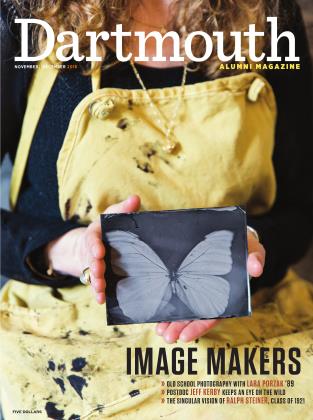First
FORRESTER A. LEE ’68 JAMES S. PRINGLE ’58
THE ODYSSEY OF DARTMOUTH’S FIRST BLACK GRADUATE, EDWARD Mitchell, class of 1828, comes to life in this scholarly account by Lee, a professor at Yale’s school of medicine, and Pringle, a botanist at the Royal Botanical Gardens in Ontario.
A Baptist minister, Mitchell was the first black student to graduate from an Ivy League school, and before him, only three other black men had graduated from U.S. colleges. “I realized how inconsequential a black man was at that time, and that makes his achievement so much more consequential,” Lee tells DAM.
When Mitchell started school, he was 32, by far the oldest freshman in his class. The trustees blocked his admission, but all four classes petitioned the board to admit him. “We think him entitled to the highest praise...[for his] noble and independent course,” they wrote. Soon after graduation Mitchell and his second wife and children left for present-day Quebec, where he preached for nearly 40 years. He was “the most profound theologian ever to have resided in this region,” a Baptist historian wrote.
Baptized Edouard Michel, a Catholic, on Martinique, he was the illegitimate child of a French official and his mistress. French was his native language, and he spoke English with an accent. Though the island was a slave colony, he was raised free.
Like a latter-day Jonah, Mitchell found his calling at sea, first aboard a French warship at age 15 and later as a sailor on an American merchant ship. But the “numerous temptations of vice” of a sailor’s life left him fearing his “wicked course,” he later wrote. When a storm hit his two-masted brig, he prayed for deliverance. Working as a porter in Philadelphia, he married, but his wife and children died, possibly in an epidemic. “Providential fate” brought him to the College. Dartmouth President Francis Brown, returning from a trip south in 1820, stayed with a merchant for whom Mitchell worked and hired him to drive a carriage home to Hanover.
Because Mitchell left no letters or diaries, his thoughts on the Civil War are unknown. In a student essay his views on human bondage were clear. “The Christian orator...would urge [listeners] to break off the shackles of slavery,” he wrote. “But it is the slavery of sin!”
George M. Spencer
 View Full Issue
View Full Issue
More From This Issue
-
 YOUR TURN
YOUR TURNYOUR TURN
NOVEMBER | DECEMBER 2018 -
 notebook
notebookMagic to Live By
NOVEMBER | DECEMBER 2018 By ROB WOLFE ’12 -
 Photography
PhotographyRestless Eye
NOVEMBER | DECEMBER 2018 By GEORGE M. SPENCER -
 PERSONAL HISTORY
PERSONAL HISTORYBlood, Guts, and Beer
NOVEMBER | DECEMBER 2018 By WILLIAM LAMB ’67 -
 class notes
class notesDeaths
NOVEMBER | DECEMBER 2018 -
 SPORTS
SPORTSThree-For-All
NOVEMBER | DECEMBER 2018 By CHARLES MONAGAN ’72
George M. Spencer
-
 notebook
notebookHerculean Task
MAY | JUNE 2018 By George M. Spencer -
 CLASSROOM
CLASSROOMA Body in Motion
MAY | JUNE 2018 By GEORGE M. SPENCER -
 ARTIFACT
ARTIFACTA Mafia Hit
JULY | AUGUST 2018 By GEORGE M. SPENCER -
 PURSUITS
PURSUITSWild Thing
SEPTEMBER | OCTOBER 2019 By George M. Spencer -
 notebook
notebookLOOK WHO'S TALKING
NOVEMBER | DECEMBER 2019 By George M. Spencer -

The 25 Most Influential Alumni
JANUARY | FEBRUARY 2019 By Rick Beyer ’78, George M. Spencer, Jim Collins ’84, 3 more ...
Pursuits
-
 PURSUITS
PURSUITSSARAH FRECH ’84 Saving lives, One Shot at a Time
JANUARY | FEBRUARY 2026 By Celine Choi ’26 -
 pursuits
pursuitsMothers of Invention
MARCH | APRIL 2018 By Heather Salerno -
 pursuits
pursuitsA Tough Test
NOVEMBER | DECEMBER 2018 By Heather Salerno -
 PURSUITS
PURSUITSFarsighted
NOVEMBER | DECEMBER 2019 By Jimmy Nguyen ’21 -
 pursuits
pursuitsBurning with Intrigue
JULY | AUGUST 2018 By Julia M. Klein -
 pursuits
pursuitsKick the Habit
NOVEMBER | DECEMBER 2017 By Sean Plottner

